- Home
- Anthony Trollope
The Belton Estate Page 3
The Belton Estate Read online
Page 3
CHAPTER III.
WILL BELTON.
Mr. Belton came to the castle, and nothing further had been said atthe cottage about his coming. Clara had seen Mrs. Askerton in themeantime frequently, but that lady had kept her promise--almost toClara's disappointment. For she--though she had in truth disliked theproposition that her cousin could be coming with any special viewswith reference to herself had nevertheless sufficient curiosity aboutthe stranger to wish to talk about him. Her father, indeed, mentionedBelton's name very frequently, saying something with reference to himevery time he found himself in his daughter's presence. A dozen timeshe said that the man was heartless to come to the house at such atime, and he spoke of his cousin always as though the man were guiltyof a gross injustice in being heir to the property. But not the lesson that account did he fidget himself about the room in which Beltonwas to sleep, about the food that Belton was to eat, and especiallyabout the wine that Belton was to drink. What was he to do for wine?The stock of wine in the cellars at Belton Castle was, no doubt, verylow. The squire himself drank a glass or two of port daily, and hadsome remnant of his old treasures by him, which might perhaps lasthim his time; and occasionally there came small supplies of sherryfrom the grocer at Taunton; but Mr. Amedroz pretended to think thatWill Belton would want champagne and claret;--and he would continueto make these suggestions in spite of his own repeated complaintsthat the man was no better than an ordinary farmer. "I've no doubthe'll like beer," said Clara. "Beer!" said her father, and thenstopped himself, as though he were lost in doubt whether it wouldbest suit him to scorn his cousin for having so low a taste as thatsuggested on his behalf, or to ridicule his daughter's idea that thehousehold difficulty admitted of so convenient a solution.
The day of the arrival at last came, and Clara certainly was in atwitter, although she had steadfastly resolved that she would be inno twitter at all. She had told her aunt by letter of the proposedvisit, and Mrs. Winterfield had expressed her approbation, sayingthat she hoped it would lead to good results. Of what good resultscould her aunt be thinking? The one probable good result wouldsurely be this--that relations so nearly connected should know eachother. Why should there be any fuss made about such a visit? But,nevertheless, Clara, though she made no outward fuss, knew thatinwardly she was not as calm about the man's coming as she would havewished herself to be.
He arrived about five o'clock in a gig from Taunton. Five was theordinary dinner hour at Belton, but it had been postponed till six onthis day, in the hope that the cousin might make his appearance atany rate by that hour. Mr. Amedroz had uttered various complaintsas to the visitor's heartlessness in not having written to name thehour of his arrival, and was manifestly intending to make the most ofthe grievance should he not present himself before six;--but thisindulgence was cut short by the sound of the gig wheels. Mr. Amedrozand his daughter were sitting in a small drawing-room, which lookedout to the front of the house and he, seated in his accustomedchair, near the window, could see the arrival. For a moment or twohe remained quiet in his chair, as though he would not allow soinsignificant a thing as his cousin's coming to ruffle him;--but hecould not maintain this dignified indifference, and before Belton wasout of the gig he had shuffled out into the hall.
Clara followed her father almost unconsciously and soon found herselfshaking hands with a big man, over six feet high, broad in theshoulders, large limbed, with bright quick grey eyes, a large mouth,teeth almost too perfect and a well-formed nose, with thick shortbrown hair and small whiskers which came but half-way down hischeeks--a decidedly handsome man with a florid face, but still,perhaps, with something of the promised roughness of the farmer. Buta more good-humoured looking countenance Clara felt at once that shehad never beheld.
"And you are the little girl that I remember when I was a boy at Mr.Folliott's?" he said. His voice was clear, and rather loud, but itsounded very pleasantly in that sad old house.
"Yes; I am the little girl," said Clara, smiling.
"Dear, dear! and that's twenty years ago now," said he.
"But you oughtn't to remind me of that, Mr. Belton."
"Oughtn't I? Why not?"
"Because it shows how very old I am."
"Ah, yes;--to be sure. But there's nobody here that signifies. Howwell I remember this room;--and the old tower out there. It isn'tchanged a bit!"
"Not to the outward eye, perhaps," said the squire.
"That's what I mean. So they're making hay still. Our hay has beenall up these three weeks. I didn't know you ever meadowed the park."Here he trod with dreadful severity upon the corns of Mr. Amedroz,but he did not perceive it. And when the squire muttered somethingabout a tenant, and the inconvenience of keeping land in his ownhands, Belton would have gone on with the subject had not Clarachanged the conversation. The squire complained bitterly of this toClara when they were alone, saying that it was very heartless.
She had a little scheme of her own,--a plan arranged for the sayingof a few words to her cousin on the earliest opportunity of theirbeing alone together,--and she contrived that this should take placewithin half an hour after his arrival, as he went through the hallup to his room. "Mr. Belton," she said, "I'm sure you will not takeit amiss if I take a cousin's privilege at once and explain to yousomething of our way of living here. My dear father is not verystrong."
"He is much altered since I saw him last."
"Oh, yes. Think of all that he has had to bear! Well, Mr. Belton,the fact is, that we are not so well off as we used to be, and areobliged to live in a very quiet way. You will not mind that?"
"Who? I?"
"I take it very kind of you, your coming all this way to see us--"
"I'd have come three times the distance."
"But you must put up with us as you find us, you know. The truth iswe are very poor."
"Well, now;--that's just what I wanted to know. One couldn't writeand ask such a question; but I was sure I should find out if I came."
"You've found it out already, you see."
"As for being poor, it's a thing I don't think very much about,--notfor young people. But it isn't comfortable when a man gets old. Nowwhat I want to know is this; can't something be done?"
"The only thing to do is to be very kind to him. He has had to letthe park to Mr. Stovey, and he doesn't like talking about it."
"But if it isn't talked about, how can it be mended?"
"It can't be mended."
"We'll see about that. But I'll be kind to him; you see if I ain't.And I'll tell you what, I'll be kind to you too, if you'll let me.You have got no brother now."
"No," said Clara; "I have got no brother now." Belton was lookingfull into her face, and saw that her eyes had become clouded withtears.
"I will be your brother," said he. "You see if I don't. When I saya thing I mean it. I will be your brother." And he took her hand,caressing it, and showing her that he was not in the least afraidof her. He was blunt in his bearing, saying things which her fatherwould have called indelicate and heartless, as though they gavehim no effort, and placing himself at once almost in a position ofascendency. This Clara had not intended. She had thought that herfarmer cousin, in spite of the superiority of his prospects as heirto the property, would have acceded to her little hints with silentacquiescence; but instead of this he seemed prepared to take uponhimself the chief part in the play that was to be acted between them."Shall it be so?" he said, still holding her hand.
"You are very kind."
"I will be more than kind; I will love you dearly if you will let me.You don't suppose that I have looked you up here for nothing. Bloodis thicker than water, and you have nobody now so near to you as Iam. I don't see why you should be so poor, as the debts have beenpaid."
"Papa has had to borrow money on his life interest in the place."
"That's the mischief! Never mind. We'll see if we can't do something.And in the meantime don't make a stranger of me. Anything does forme. Lord bless you! if you were to see how I rough it sometimes
!I can eat beans and bacon with any one; and what's more, I can gowithout 'em if I can't get 'em."
"We'd better get ready for dinner now. I always dress, because papalikes to see it." This she said as a hint to her cousin that hewould be expected to change his coat, for her father would have beenannoyed had his guest sat down to dinner without such ceremony. WillBelton was not very good at taking hints; but he did understand this,and made the necessary change in his apparel.
The evening was long and dull, and nothing occurred worthy of remarkexcept the surprise manifested by Mr. Amedroz when Belton called hisdaughter by her Christian name. This he did without the slightesthesitation, as though it were the most natural thing in the world forhim to do. She was his cousin, and cousins of course addressed eachother in that way. Clara's quick eye immediately saw her father'sslight gesture of dismay, but Belton caught nothing of this. Thesquire took an early opportunity of calling him Mr. Belton with somelittle peculiarity of expression; but this was altogether lost uponWill, who five times in the next five minutes addressed "Clara" asthough they were already on the most intimate terms. She would haveanswered him in the same way, and would have called him Will, had shenot been afraid of offending her father.
Mr. Amedroz had declared his purpose of coming down to breakfastduring the period of his cousin's visit, and at half-past nine he wasin the parlour. Clara had been there some time, but had not seen hercousin. He entered the room immediately after her father, bringinghis hat with him in his hand, and wiping the drops of perspirationfrom his brow. "You have been out, Mr. Belton," said the squire.
"All round the place, sir. Six o'clock doesn't often find me in bed,summer or winter. What's the use of laying in bed when one has hadenough of sleep?"
"But that's just the question," said Clara; "whether one has hadenough at six o'clock."
"Women want more than men, of course. A man, if he means to do anygood with land, must be out early. The grass will grow of itself atnights, but it wants looking after as soon as the daylight comes."
"I don't know that it would do much good to the grass here," said thesquire, mournfully.
"As much here as anywhere. And indeed I've got something to say aboutthat." He had now seated himself at the breakfast-table, and wasplaying with his knife and fork. "I think, sir, you're hardly makingthe best you can out of the park."
"We won't mind talking about it, if you please," said the squire.
"Well; of course I won't, if you don't like it; but upon my word youought to look about you; you ought indeed."
"In what way do you mean?" said Clara.
"If your father doesn't like to keep the land in his own hands, heshould let it to some one who would put stock in it,--not go oncutting it year after year, and putting nothing back, as this fellowwill do. I've been talking to Stovey, and that's just what he means."
"Nobody here has got money to put stock on the land," said thesquire, angrily.
"Then you should look for somebody somewhere else. That's all. I'lltell you what now, Mr. Amedroz, I'll do it myself." By this time hehad helped himself to two large slices of cold mutton, and was eatinghis breakfast and talking with an equal amount of energy for eitheroccupation.
"That's out of the question," said the squire.
"I don't see why it should be out of the question. It would be betterfor you,--and better for me too, if this place is ever to be mine."On hearing this the squire winced, but said nothing. This terriblefellow was so vehemently outspoken that the poor old man wasabsolutely unable to keep pace with him,--even to the repeatingof his wish that the matter should be talked of no further. "I'lltell you what I'll do, now," continued Belton. "There's altogether,outside the palings and in, about a hundred and fifty acres ofit. I'll give you one pound two and sixpence an acre, and I won'tcut an acre of grass inside the park;--no, nor much of it outsideeither;--only just enough to give me a little fodder for the cattlein winter."
"And give up Plaistow Hall?" asked Clara.
"Lord love you, no. I've a matter of nine hundred acres on handthere, and most of it under the plough. I've counted it up, and itwould just cost me a thousand pounds to stock this place. I shouldcome and look at it twice a year or so, and I should see my moneyhome again, if I didn't get any profit out of it."
Mr. Amedroz was astonished. The man had only been in his house onenight, and was proposing to take all his troubles off his hands. Hedid not relish the proposition at all. He did not like to be accusedof not doing as well for himself as others could do for him. He didnot wish to make any change,--although he remembered at the momenthis anger with Farmer Stovey respecting the haycarts. He did notdesire that the heir should have any immediate interest in the place.But he was not strong enough to meet the proposition with a directnegative. "I couldn't get rid of Stovey in that way," he said,plaintively.
"I've settled it all with Stovey already," said Belton. "He'll beglad enough to walk off with a twenty-pound note, which I'll givehim. He can't make money out of the place. He hasn't got means tostock it, and then see the wages that hay-making runs away with! He'dlose by it even at what he's paying, and he knows it. There won't beany difficulty about Stovey."
By twelve o'clock on that day Mr. Stovey had been brought into thehouse, and had resigned the land. It had been let to Mr. WilliamBelton at an increased rental,--a rental increased by nearly fortypounds per annum,--and that gentleman had already made many of hisarrangements for entering upon his tenancy. The twenty pounds hadalready been paid to Stovey, and the transaction was complete. Mr.Amedroz sat in his chair bewildered, dismayed--and, as he himselfdeclared,--shocked, quite shocked, at the precipitancy of the youngman. It might be for the best. He didn't know. He didn't feel atall sure. But such hurrying in such a matter was, under all thecircumstances of the family, to say the least of it, very indelicate.He was angry with himself for having yielded, and angry with Clarafor having allowed him to do so. "It doesn't signify much," he said,at last. "Of course he'll have it all to himself before long."
"But, papa, it really seems to be a much better arrangement for you.You'll get more money--"
"Money is not everything, my dear."
"But you'd sooner have Mr. Belton, our own cousin, about the place,than Mr. Stovey."
"I don't know. We shall see. The thing is done now, and there isno use in complaining. I must say he hasn't shown a great deal ofdelicacy."
On that afternoon Belton asked Clara to go out with him, and walkround the place. He had been again about the grounds, and had madeplans, and counted up capabilities, and calculated his profit andlosses. "If you don't dislike scrambling about," said he, "I'll showyou everything that I intend to do."
"But I can't have any changes made, Mr. Belton," said Mr. Amedroz,with some affectation of dignity in his manner. "I won't have thefences moved, or anything of that kind."
"Nothing shall be done, sir, that you don't approve. I'll just manageit all as if I was acting as your own--bailiff." "Son," he was goingto say, but he remembered the fate of his cousin Charles just in timeto prevent the use of the painful word.
"I don't want to have anything done," said Mr. Amedroz.
"Then nothing shall be done. We'll just mend a fence or two, to keepin the cattle, and leave other things as they are. But perhaps Clarawill walk out with me all the same."
Clara was quite ready to walk out, and had already tied on her hatand taken her parasol.
"Your father is a little nervous," said he, as soon as they werebeyond hearing of the house.
"Can you wonder at it, when you remember all that he has suffered?"
"I don't wonder at it in the least; and I don't wonder at hisdisliking me either."
"I don't think he dislikes you, Mr. Belton."
"Oh, but he does. Of course he does. I'm the heir to the placeinstead of you. It is natural that he should dislike me. But I'lllive it down. You see if I don't. I'll make him so fond of me, he'llalways want to have me here. I don't mind a little dislike to beginwith."
"You're a wonderful man, Mr. Belton."
"I wish you wouldn't call me Mr. Belton. But of course you must doas you please about that. If I can make him call me Will, I supposeyou'll call me so too."
"Oh, yes; then I will."
"It don't much matter what a person is called; does it? Only onelikes to be friendly with one's friends. I suppose you don't like mycalling you Clara."
"Now you've begun you had better go on."
"I mean to. I make it a rule never to go back in the world. Yourfather is half sorry that he has agreed about the place; but I shan'tlet him off now. And I'll tell you what. In spite of what he says,I'll have it as different as possible before this time next year.Why, there's lots of timber that ought to come out of the plantation;and there's places where the roots want stubbing up horribly. Thesethings always pay for themselves if they are properly done. Any gooddone in the world always pays." Clara often remembered those wordsafterwards when she was thinking of her cousin's character. Any gooddone in the world always pays!
"But you mustn't offend my father, even though it should do good,"she said.
"I understand," he answered. "I won't tread on his toes. Where do youget your milk and butter?"
"We buy them."
"From Stovey, I suppose."
"Yes; from Mr. Stovey. It goes against the rent."
"And it ought to go against the grain too,--living in the country andpaying for milk! I'll tell you what I'll do. I'll give you a cow.It shall be a little present from me to you." He said nothing ofthe more important present which this would entail upon him in thematter of the grass for the cow; but she understood the nature of thearrangement, and was anxious to prevent it.
"Oh, Mr. Belton, I think we'd better not attempt that," she said.
"But we will attempt it. I've pledged myself to do nothing to opposeyour father; but I've made no such promise as to you. We'll have acow before I'm many days older. What a pretty place this is! I dolike these rocks so much, and it is such a comfort to be off theflat."
"It is pretty."
"Very pretty. You've no conception what an ugly place Plaistow is.The land isn't actual fen now, but it was once. And it's quite flat.And there is a great dike, twenty feet wide, oozing through it,--justoozing, you know; and lots of little dikes, at right angles with thebig one. And the fields are all square. And there are no hedges,--andhardly a tree to be seen in the place."
"What a picture you have drawn! I should commit suicide if I livedthere."
"Not if you had so much to do as I have."
"And what is the house like?"
"The house is good enough,--an old-fashioned manor-house, with highbrick chimneys, and brick gables, tiled all over, and large squarewindows set in stone. The house is good enough, only it stands in themiddle of a farm-yard. I said there were no trees, but there is anavenue."
"Come, that's something."
"It was an old family seat, and they used to have avenues in thosedays; but it doesn't lead up to the present hall door. It comessideways up to the farm-yard; so that the whole thing must havebeen different once, and there must have been a great court-yard.In Elizabeth's time Plaistow Manor was rather a swell place, andbelonged to some Roman Catholics who came to grief, and then theHowards got it. There's a whole history about it, only I don't muchcare about those things."
"And is it yours now?"
"It's between me and my uncle, and I pay him rent for his part. He'sa clergyman you know, and he has a living in Lincolnshire,--not faroff."
"And do you live alone in that big house?"
"There's my sister. You've heard of Mary;--haven't you?"
Then Clara remembered that there was a Miss Belton,--a poor sicklycreature, with a twisted spine and a hump back, as to whose welfareshe ought to have made inquiries.
"Oh, yes; of course," said Clara. "I hope she's better than she usedto be,--when we heard of her."
"She'll never be better. But then she does not become much worse.I think she does grow a little weaker. She's older than I am, youknow,--two years older; but you would think she was quite an oldwoman to look at her." Then, for the next half-hour, they talkedabout Mary Belton as they visited every corner of the place. Beltonstill had an eye to business as he went on talking, and Clararemarked how many sticks he moved as he went, how many stones hekicked on one side, and how invariably he noted any defect in thefences. But still he talked of his sister, swearing that she was asgood as gold, and at last wiping away the tears from his eyes as hedescribed her maladies. "And yet I believe she is better off than anyof us," he said, "because she is so good." Clara began to wish thatshe had called him Will from the beginning, because she liked himso much. He was just the man to have for a cousin,--a true lovingcousin, stalwart, self-confident, with a grain or two of tyranny inhis composition as becomes a man in relation to his intimate femalerelatives; and one, moreover, with whom she could trust herself tobe familiar without any danger of love-making! She saw his characterclearly, and told herself that she understood it perfectly. He was ajewel of a cousin, and she must begin to call him Will as speedily aspossible.
At last they came round in their walk to the gate leading intoColonel Askerton's garden; and here in the garden, close to the gate,they found Mrs. Askerton. I fancy that she had been watching forthem, or at any rate watching for Clara, so that she might know howher friend was carrying herself with her cousin. She came at once tothe wicket, and there she was introduced by Clara to Mr. Belton. Mr.Belton as he made his bow muttered something awkwardly, and seemedto lose his self-possession for the moment. Mrs. Askerton was verygracious to him, and she knew well how to be both gracious andungracious. She talked about the scenery, and the charms of theold place, and the dullness of the people around them, and theinexpediency of looking for society in country places; till afterawhile Mr. Belton was once more at his ease.
"How is Colonel Askerton?" asked Clara.
"He's in-doors. Will you come and see him? He's reading a Frenchnovel, as usual. It's the only thing he ever does in summer. Do youever read French novels, Mr. Belton?"
"I read very little at all, and when I do I read English."
"Ah, you're a man who has a pursuit in life, no doubt."
"I should rather think so,--that is, if you mean, by a pursuit,earning my bread. A man has not much time for French novels with athousand acres of land on his hands; even if he knew how to readFrench, which I don't."
"But you're not always at work on your farm?"
"It's pretty constant, Mrs. Askerton. Then I shoot, and hunt."
"You're a sportsman?"
"All men living in the country are,--more or less."
"Colonel Askerton shoots a great deal. He has the shooting of Belton,you know. He'll be delighted, I'm sure, to see you if you are heresome time in September. But you, coming from Norfolk, would not carefor partridge-shooting in Somersetshire."
"I don't see why it shouldn't be as good here as there."
"Colonel Askerton thinks he has got a fair head of game upon theplace."
"I dare say. Game is easily kept if people knew how to set about it."
"Colonel Askerton has a very good keeper, and has gone to a greatdeal of expense since he has been here."
"I'm my own head-keeper," said Belton; "and so I will be,--or rathershould be, if I had this place."
Something in the lady's tone had grated against his feelings andoffended him; or perhaps he thought that she assumed too many of theairs of proprietorship because the shooting of the place had been letto her husband for thirty pounds a-year.
"I hope you don't mean to say you'll turn us out," said Mrs.Askerton, laughing.
"I have no power to turn anybody out or in," said he. "I've gotnothing to do with it."
Clara, perceiving that matters were not going quite pleasantlybetween her old and new friend, thought it best to take herdeparture. Belton, as he went, lifted his hat from his head, andClara could not keep herself from thinking that he was not only veryhandsome, but that h
e looked very much like a gentleman, in spite ofhis occupation as a farmer.
"By-bye, Clara," said Mrs. Askerton; "come down and see me to-morrow,there's a dear. Don't forget what a dull life I have of it." Clarasaid that she would come. "And I shall be so happy to see Mr. Beltonif he will call before he leaves you." At this Belton again raisedhis hat from his head, and muttered some word or two of civility. Butthis, his latter muttering, was different from the first, for he hadaltogether regained his presence of mind.
"You didn't seem to get on very well with my friend," said Clara,laughing, as soon as they had turned away from the cottage.
"Well, no;--that is to say, not particularly well or particularlybadly. At first I took her for somebody else I knew slightly ever solong ago, and I was thinking of that other person at the time."
"And what was the other person's name?"
"I can't even remember that at the present moment."
"Mrs. Askerton was a Miss Oliphant."
"That wasn't the other lady's name. But, independently of that, theycan't be the same. The other lady married a Mr. Berdmore."
"A Mr. Berdmore!" Clara as she repeated the name felt convinced thatshe had heard it before, and that she had heard it in connectionwith Mrs. Askerton. She certainly had heard the name of Berdmorepronounced, or had seen it written, or had in some shape come acrossthe name in Mrs. Askerton's presence; or at any rate somewhere onthe premises occupied by that lady. More than this she could notremember; but the name, as she had now heard it from her cousin,became at once distinctly connected in her memory with her friends atthe cottage.
"Yes," said Belton; "a Mr. Berdmore. I knew more of him than of her,though for the matter of that, I knew very little of him either. Shewas a fast-going girl, and his friends were very sorry. But I thinkthey are both dead or divorced, or that they have come to grief insome way."
"And is Mrs. Askerton like the fast-going lady?"
"In a certain way. Not that I remember what the fast-going lady waslike; but there was something about this woman that put me in mind ofthe other. Vigo was her name; now I recollect it,--a Miss Vigo. It'snine or ten years ago now, and I was little more than a boy."
"Her name was Oliphant."
"I don't suppose they have anything to do with each other. What riledme was the way she talked of the shooting. People do when they takea little shooting. They pay some trumpery thirty or forty pounds ayear, and then they seem to think that it's almost the same as thoughthey owned the property themselves. I've known a man talk of hismanor because he had the shooting of a wood and a small farm roundit. They are generally shopkeepers out of London, gin distillers, orbrewers, or people like that."
"Why, Mr. Belton, I didn't think you could be so furious!"
"Can't I? When my back's up, it is up! But it isn't up yet."
"And I hope it won't be up while you remain in Somersetshire."
"I won't answer for that. There's Stovey's empty cart standingjust where it stood yesterday; and he promised he'd have it homebefore three to-day. My back will be up with him if he doesn't mindhimself."
It was nearly six o'clock when they got back to the house, and Clarawas surprised to find that she had been out three hours with hercousin. Certainly it had been very pleasant. The usual companionof her walks, when she had a companion, was Mrs. Askerton; but Mrs.Askerton did not like real walking. She would creep about the groundsfor an hour or so, and even such companionship as that was better toClara than absolute solitude; but now she had been carried about theplace, getting over stiles and through gates, and wandering throughthe copses, till she was tired and hungry, and excited and happy."Oh, papa," she said, "we have had such a walk!"
"I thought we were to have dined at five," he replied, in a lowwailing voice.
"No, papa, indeed,--indeed you said six."
"That was for yesterday."
"You said we were to make it six while Mr. Belton was here."
"Very well;--if it must be, I suppose it must be."
"You don't mean on my account," said Will. "I'll undertake to eatmy dinner, sir, at any hour that you'll undertake to give it me. Ifthere's a strong point about me at all, it is my appetite."
Clara, when she went to her father's room that evening, told him whatMr. Belton had said about the shooting, knowing that her father'sfeelings would agree with those which had been expressed by hercousin. Mr. Amedroz of course made this an occasion for furthergrumbling, suggesting that Belton wanted to get the shooting forhimself as he had got the farm. But, nevertheless, the effect whichClara had intended was produced, and before she left him he hadabsolutely proposed that the shooting and the land should gotogether.
"I'm sure that Mr. Belton doesn't mean that at all," said Clara.
"I don't care what he means," said the squire.
"And it wouldn't do to treat Colonel Askerton in that way," saidClara.
"I shall treat him just as I like," said the squire.

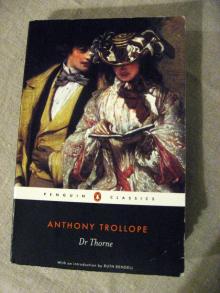 Doctor Thorne
Doctor Thorne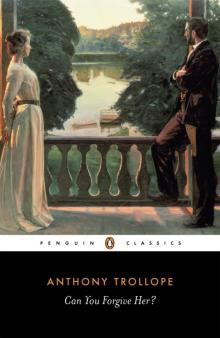 Can You Forgive Her?
Can You Forgive Her?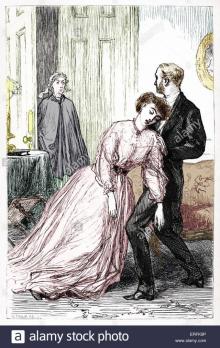 The Last Chronicle of Barset
The Last Chronicle of Barset The Fixed Period
The Fixed Period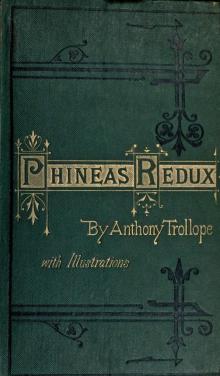 Phineas Redux
Phineas Redux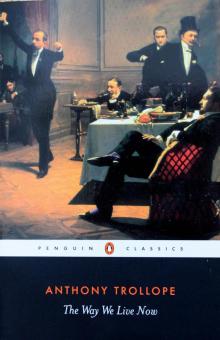 The Way We Live Now
The Way We Live Now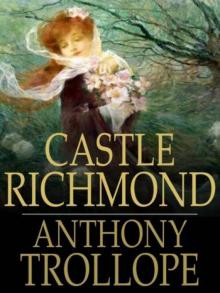 Castle Richmond
Castle Richmond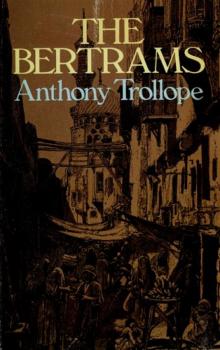 The Bertrams
The Bertrams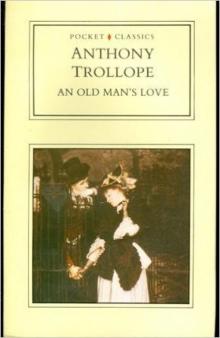 An Old Man's Love
An Old Man's Love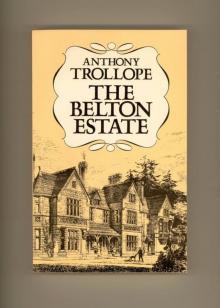 The Belton Estate
The Belton Estate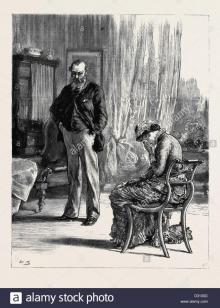 Marion Fay: A Novel
Marion Fay: A Novel The Claverings
The Claverings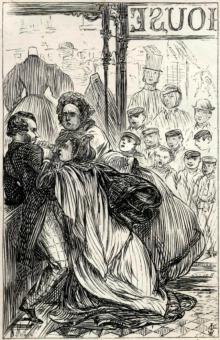 The Struggles of Brown, Jones, and Robinson
The Struggles of Brown, Jones, and Robinson Nina Balatka
Nina Balatka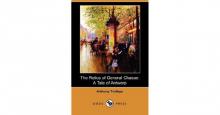 The Relics of General Chasse: A Tale of Antwerp
The Relics of General Chasse: A Tale of Antwerp Barchester Towers cob-2
Barchester Towers cob-2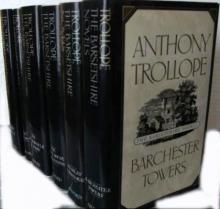 The Chronicles of Barsetshire
The Chronicles of Barsetshire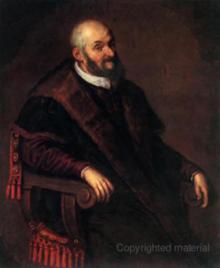 The Warden cob-1
The Warden cob-1 Framley Parsonage
Framley Parsonage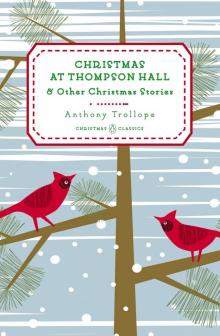 Christmas at Thompson Hall
Christmas at Thompson Hall The Warden
The Warden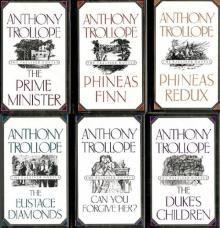 The Palliser Novels
The Palliser Novels The Small House at Allington
The Small House at Allington Barchester Towers
Barchester Towers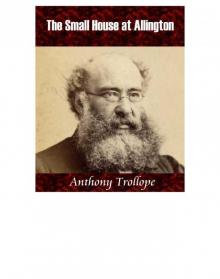 The Small House at Allington cob-5
The Small House at Allington cob-5 The Duke's Children
The Duke's Children Phineas Finn, the Irish Member
Phineas Finn, the Irish Member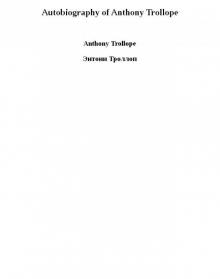 Autobiography of Anthony Trollope
Autobiography of Anthony Trollope